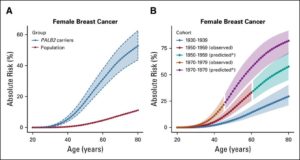For decades doctors have known that women carrying the mutation for the BRCA-1 or BRCA-2 gene were at grave risk for developing breast cancer over their lifetimes. In the last few years numerous additional genes have been discovered that result in similar risk. These have not been studied as thoroughly but are potentially very important. The best studied of these new genes is Palb-2, which interacts with BRCA-2 in ways that are just beginning to be understood. A landmark paper from Cambridge, England, with many co-authors, some of whom work for biotech companies, published in the Journal of Clinical Oncology has looked at the impact of this mutation for the women who carry it. Click here for the abstract. Dr. Stark can provide the full article. Click on the box to the right of this post to message him. They conclude that the lifetime risk of breast cancer is huge — in some cases approaching 80% — and comparable to that seen with the BRCA mutations. A surprising result was the dramatic overall increase in breast cancer risk seen in the group of women analyzed as controls. See the graphs at the left for details.  Over the birth years from 1930 to 1980 there was a greater than three-fold increased risk of breast cancer in women without the gene. The authors can only speculate as to cause — better diagnostic testing, environmental pollution, as examples — but fundamentally they do not know. For anyone reading this, be warned that if you have a strong family history of breast cancer, it is not enough to get just BRCA 1 and 2 testing. You should get comprehensive testing across all of these newly described mutations. Fortunately all of this is commercially available. Stay tuned for further developments as this rapidly changing field evolves.
Over the birth years from 1930 to 1980 there was a greater than three-fold increased risk of breast cancer in women without the gene. The authors can only speculate as to cause — better diagnostic testing, environmental pollution, as examples — but fundamentally they do not know. For anyone reading this, be warned that if you have a strong family history of breast cancer, it is not enough to get just BRCA 1 and 2 testing. You should get comprehensive testing across all of these newly described mutations. Fortunately all of this is commercially available. Stay tuned for further developments as this rapidly changing field evolves.